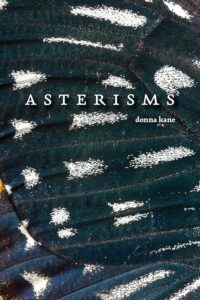Gravity and light through a poetic lens
Asterisms
by Donna Kane
Madeira Park: Harbour Publishing, 2024
$22.95 / 9871990776717
Reviewed by gillian harding-russell
*

In Asterisms, Peace Country poet Donna Kane (Summer Horse) writes a “follow up” to her 2020 poetry collection Orrery, both of which feature astronomy and nature.
Here in Asterisms, we witness the poet’s marvel at nature and the cosmos where everything is seen to be connected. Reminding me of an image from “Life as Silk Rug,” in which the rug is compared to “a carpet of stars” that “seems never to change / though always, some are winking in, some are winking out,” the cover design features worn-out fabric with rubbed paler parts that let in the light as might constellations in a night sky.
In a typographical motif, sections are prefaced with three asterisks as a kind of shorthand star cluster as well as to connote pay attention and, accordingly, in each poem in this starry collection, we are invited to share the poet’s thoughts. These range into the sciences but remain firmly grounded in the everyday and are characterized by homey bursts of whimsy and humour.
In the prologue poem “On Visible Light,” “knowledge” is seen to be the “fruit” of light while stars that emit photons are registered through our interpreting perceptions. The reader is prepared for an elucidating as well as an engaging and inspiring journey in reading the poems ahead. Kane writes,
Knowledge is the fruiting body of light,
and light the fruiting body of photons
at the end of travelling through our nights
to reach the velvet chair, the common snipe,
and here I picture the fabric image associated with the cover design as echoed in the “velvet chair” where the material is worn pale like stars in a sky. I stumbled on “common snipe,” but picture that figure (rhyming in a pattern of end-rhymes as knots at a knitted edge) as referring to the person seated in the chair and gazing out a window at the cosmos. In the next line, the introductory verse, “knowledge is the fruiting body of light,” is woven back into the poem and, indeed, is intermittently woven through to the weft of the poem’s loom to dramatize an implicit fabric metaphor that might suggest a circularity to knowledge, while the perceiver is always “wanting what is beyond our sight.”

Not surprising in a vision of the universe “stitched together,” love is featured in Asterisms.
In a metaphysical conceit that would tickle John Donne with his compass image, the speaker in “Raindrop Creates a Rainbow After Meeting a Shaft of Light” compares her lover to a “shaft of light” and herself to a “raindrop,” “denser than what you were / used to”; and here “denser” takes on humorous double entendre as both scientific terminology and colloquial innuendo. With sexual suggestion, the poem continues playfully: “When your light entered me, / I got so excited, I fell into / the groove of you.” And so the poem progresses on dual levels to comment on how the speaker’s partner’s erudite knowledge has inspired her poetry and craft.
Some of the best poems in Asterisms reflect on scientific learning from a down-to-earth perspective.
In “Memory” the bees that feast on the picnickers’ skin transform their sweat into their honey inside the “memory” cells of their wax beehive.
On learning that the horseshoe crab has been abused in the cause of science while their valuable blue blood is extracted in testing for bacteria used in Covid vaccines, the speaker in “Dear Horseshoe Crab” addresses the creature with deference and a kind of reverence for its ancestry that extends back in time to “Gondwanaland, Pangaea” and “dinosaurs. Although by federal law the crabs are supposed to be released after their blood is drawn, many die off. Here the speaker strikes an ironic note that might have pleased Jonathan Swift: “but what I wish to say is // we didn’t intend to kill you, / we only wanted your miraculous blood (so blue!),” and later, with disturbingly urbane understatement, “it can’t be all that pleasant.”
Again, the speaker voice is engaging and humorous, with self-irony coming into play in “Can You Give Me My Little Skull.” Having one evening dreamed up an idea, “sweet as a Molasses Kiss,” the speaker reached for her journal but, alas, the idea had vanished—
I know I was given something before it disappeared,
but you can’t ask the brain, she’s head down,
rummaging through the chaos, unwrapping
then tossing me each approved thing
like she never needs to see it again.
The image of the brain “head down” in the garbage with cartoon comedy choreographs the speaker’s psychological loss and frantic mind search in the manner of a graphic tableau.
A central theme in Asterisms concerns the interconnectivity of the universe whereby star clusters in forming constellations that can be named come to be understood in those terms.
In “Wayfarer,” the speaker loves all creatures from “earthworms” and “wood frogs” to “bumble bees,” but after regretting the imminent loss of nature, she comes to an insight—“we won’t know our imagination’s / shrivelled because we’ll have nothing left / to compare ourselves to”—that with all of nature gone, how will we be able to describe our loss in language since all of our metaphors derive from nature?
With deflating irony, the speaker’s purpose here is evidently to sharpen (rather than downplay) our sense of that potential loss in order to inspire us to safeguard it. Kane’s point is poignant.
In the closing poem, “Love Poem for Every Animal on Earth,” the fabric theme for the cosmos in its inter-connectedness is again applied to nature in all its aspects.
“Gravity is a tailor” not only “stitching planets around stars” but notably with “pearl buttons cinched tight,” like “hearts inside the rib cage / of the elephant or the shrew.” Allowing poetic form to dramatize the fabric metaphor, the line “the elephant or the shrew” at the end of the second stanza is interwoven in the first line in the next stanza. Again, in the penultimate line: “Held together in this world,” is repeated in staggered and decremental form (one word less) in the final, single-stanza verse: “Together in this world.”
Here is an intricate closing poem that ties to the opening poem “Wayfarer,” both formally and thematically, and, in doing so, provides pleasing closure.
Asterisms is a well-integrated collection in which the poems are connected to each other thematically as well as formally, often using “weaving” patterns of repetition into the verse. Moreover, these finely-crafted poems are engaging to read, often highly informative and insightful with their call to love and embrace nature as part of the larger cosmos.
*
A poet, editor, and reviewer, gillian harding-russell’s most recent poetry collections include In Another Air (Radiant Press, 2018) and Uninterrupted (Ekstasis Editions, 2020), both nominated for Saskatchewan Book Awards. Also, in 2021 The Alfred Gustav Press released Megrim, a chapbook. Her work has been published widely in literary journals across Canada. She lives on Treaty 4 territory. [Editor’s note: gillian harding-russell has written about collections by Diana Hayes, Susan McCaslin, Marlene Grand Maître, and Ian Thomas in BCR.]
*
The British Columbia Review
Interim Editors, 2023-25: Trevor Marc Hughes (nonfiction), Brett Josef Grubisic (fiction)
Publisher: Richard Mackie
Formerly The Ormsby Review, The British Columbia Review is an online book review and journal service for BC writers and readers. The Advisory Board now consists of Jean Barman, Wade Davis, Robin Fisher, Barry Gough, Hugh Johnston, Kathy Mezei, Patricia Roy, Maria Tippett, and Graeme Wynn. Provincial Government Patron (since September 2018): Creative BC. Honorary Patron: Yosef Wosk. Scholarly Patron: SFU Graduate Liberal Studies. The British Columbia Review was founded in 2016 by Richard Mackie and Alan Twigg.
“Only connect.” – E.M. Forster